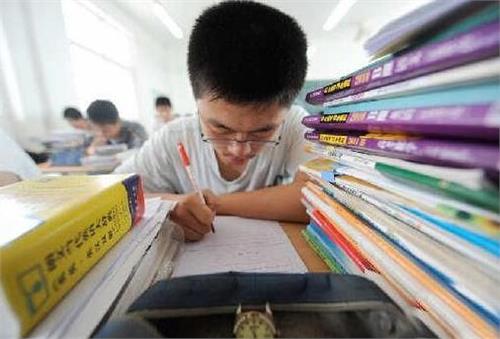


(file photo)
China's education authorities have pledged zero tolerance for any mainland students found to be posing as overseas Chinese to get an easier ride into the country's top universities.
According to a People's Daily report on April 26, the Ministry of Education(MOE) is collaborating with the Overseas Chinese Affair Office of the State Council on a probe into claims that agencies are helping mainland students acquire "overseas Chinese identifications" to take advantage of the bonuses such students are given in college entrance exams.
Since 1985, the MOE has allowed students of Chinese origin that are residents of other countries, or students from Hong Kong, Macau and Taiwan to take different college entrance exams from mainland students in order to strengthen these students' Chinese bond.
Less testing tests
As these exams aim to bring more overseas students into China, they are significantly easier than the exams mainland students must sit.
A Beijing education agency employee told the People's Daily that the exams for overseas students mostly cover materials from the junior high school level and the first two years of high school. He stressed that they are far easier than the normal entrance exams.
Except China's top few universities such as Tsinghua Univeristy and Peking University, enrollments set aside for overseas Chinese candidates are often left empty at other relatively good universities. It is these places at less-in demand but still high quality schools that the agencies mostly target.
Advertising pitch
"We can send you to Project 211 universities if you can get 200 points in the exams, and Project 985 universities if you can score 400," read education agencies' advertisements, referring to two distinctive groups of top universities in China.
This practice has been an issue since 2005, and to curb it the education authorities stipulated that from 2006 on all overseas candidates for the easier entrance exam will have to prove they have lived outside the Chinese mainland for at least two of the last four years, in addition to possessing overseas permanent residency, or residency proof of Hong Kong, Macau and Taiwan.
Such agencies, which are usually based in large cities like Beijing, Shanghai and Shenzhen, promise to help mainlanders acquire "overseas Chinese identification," by exploiting the permanent residency policies of countries like the Philippines and Malaysia as a "springboard," according to a China Education Daily report on April 22.
These two countries are particularly popular as their permanent residency policies are relatively liberal.
An employee with a Shenzhen-based education agency was quoted by the People's Daily as saying that the agency charges each student 276,000 yuan ($39,988) for the whole process, which lasts over two years and includes up to 20 months of studying in Manila to get a "green card."
"Our greatest strength lies in that we have our own education base in Perak State, Malaysia," said an employee of another Beijing-based education agency.
In fact many such agencies boast they work with overseas partners or single-handedly run schools in the Philippines or Malaysia.
Crowding out
"Those who are really born and raised overseas usually cannot beat these mainland students in the exams," Liu Haifeng, head of the Institute of Education under Xiamen University told China Education Daily.
Liu expressed his concern over the practice of faking overseas identification, saying it has created a "crowding-out effect," and real overseas Chinese are missing out on getting a place at good mainland universities.
"Although it is unfair, the practice of faking overseas identification is technically not against any law," Yang Yiping, member of the legal counsel committee of the All-China Federation of Returned Overseas Chinese, told China Education Daily.
Yang also advised that since the only goal is for the student to sit the exam, the parents of the candidates are unlikely to want to pay for the student to stay abroad for a long time in order to legitimately meet the requirements for taking the exam. He said the authorities should work on developing a more effective vetting process to spot this.
Also the relevant departments should pay extra attention to candidates who have residencies of "questionable countries" such as the Philippines and Malaysia, he noted.
 Fire brigade in Shanghai holds group wedding
Fire brigade in Shanghai holds group wedding Tourists enjoy ice sculptures in Datan Town, north China
Tourists enjoy ice sculptures in Datan Town, north China Sunset scenery of Dayan Pagoda in Xi'an
Sunset scenery of Dayan Pagoda in Xi'an Tourists have fun at scenic spot in Nanlong Town, NW China
Tourists have fun at scenic spot in Nanlong Town, NW China Harbin attracts tourists by making best use of ice in winter
Harbin attracts tourists by making best use of ice in winter In pics: FIS Alpine Ski Women's World Cup Slalom
In pics: FIS Alpine Ski Women's World Cup Slalom Black-necked cranes rest at reservoir in Lhunzhub County, Lhasa
Black-necked cranes rest at reservoir in Lhunzhub County, Lhasa China's FAST telescope will be available to foreign scientists in April
China's FAST telescope will be available to foreign scientists in April "She power" plays indispensable role in poverty alleviation
"She power" plays indispensable role in poverty alleviation Top 10 world news events of People's Daily in 2020
Top 10 world news events of People's Daily in 2020 Top 10 China news events of People's Daily in 2020
Top 10 China news events of People's Daily in 2020 Top 10 media buzzwords of 2020
Top 10 media buzzwords of 2020 Year-ender:10 major tourism stories of 2020
Year-ender:10 major tourism stories of 2020 No interference in Venezuelan issues
No interference in Venezuelan issues
 Biz prepares for trade spat
Biz prepares for trade spat
 Broadcasting Continent
Broadcasting Continent Australia wins Chinese CEOs as US loses
Australia wins Chinese CEOs as US loses